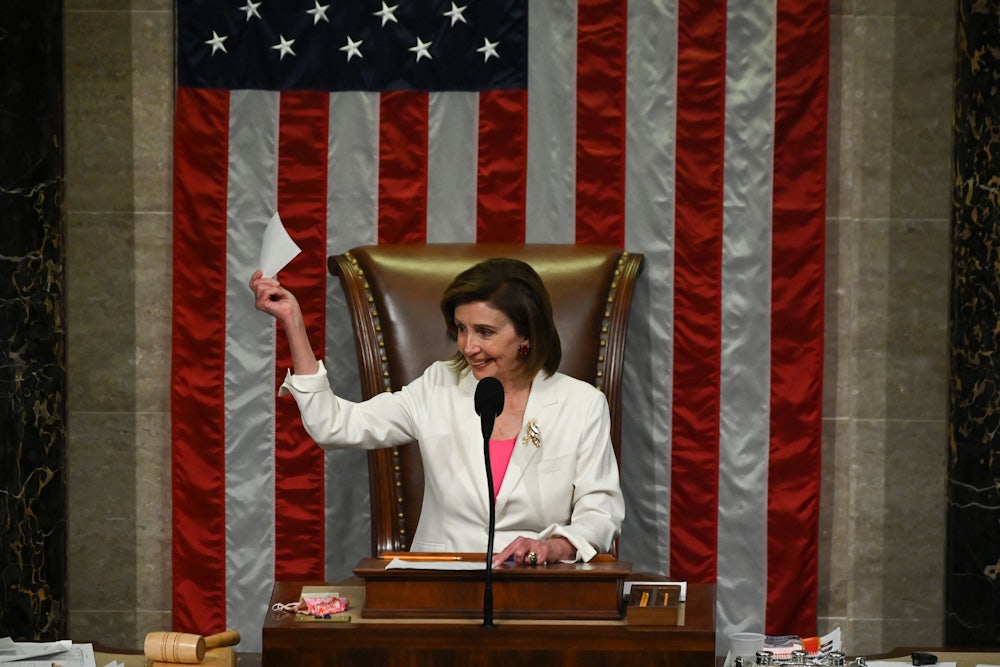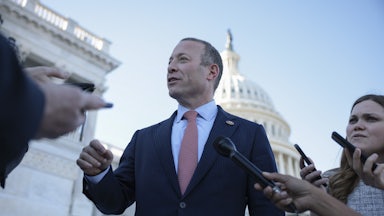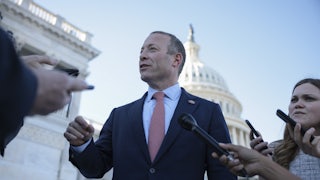On Thursday evening, the Congressional Budget Office, or CBO, finally released what everyone on Capitol Hill had been breathlessly awaiting: its score of the Build Back Better Act, the multitrillion-dollar spending bill that will likely be the foundation of the party’s midterms pitch next year. For weeks, Democrats had fretted over the score’s impact. Given the financial jujitsu required to say, as Joe Biden did, that the multitrillion-dollar bill would “cost zero dollars”—the underlying idea being that tax increases for the wealthy would pay for the bill’s climate change, health care, and childcare provisions—there were concerns that the CBO would take a more skeptical eye to the White House’s projections about the bill’s costs.
There were, moreover, political concerns. Conservative Democrats had been using the coming CBO score as a cudgel for weeks, intimating that their support for the measure might hinge on the budget referees’ decision. There was every reason to feel tense, given that many of these Democrats had been holding up advancing the Build Back Better Act for weeks on end. Could a CBO score that showed a significant increase in the deficit kill the bill? It was not outside the realm of possibility. Some in the Biden administration were spooked enough that they started controlling expectations, telling reporters they were bracing for a bad result.
In the end, the CBO score came not with a bang but a whimper. The very lawmakers who originally seemed the most likely to bolt over bad news had spent the hours leading up to the big reveal offering The New Republic’s Grace Segers nary a discouraging word. And when the CBO’s findings finally dropped on Thursday, the results were almost entirely positive. Yes, the budget deficit would likely increase, but by an amount that is, essentially, a rounding error by the standards of the federal government: $16 billion a year over 10 years. Given the CBO’s own well-earned reputation for conservative scoring, this was quite a win. House Democrats responded by narrowly passing the Build Back Better Act on Friday morning, sending the bill to the Senate. Meanwhile, the CBO’s good news has, unsurprisingly, gone unremarked upon by the bill’s Republican detractors and has been largely ignored by the media because it didn’t do enough to foment conflict or provide a “Dems in disarray” narrative.
But what if a more discouraging score had sloughed out of the CBO’s sanctum sanctorum? Ahh, it’s easy to imagine the reaction: It would be volcanic, from Republicans, conservative Democrats, and the press alike. It might even have sunk the bill, with waffling Democrats finally being handed the ammunition they needed to put it out of its misery. Instead, in the Senate, those Democrats who had previously insisted on a full CBO score before considering the House’s bill—most notably, Joe Manchin—will simply move on to other excuses, namely inflation, as if nothing had happened.
There should be a lesson here for Democrats and the press about the CBO: Everything is made up, and the points don’t matter. These scores are little more than the fuel for prewritten pretexts, an elaborate ritual whose importance is in the realm of political optics, rather than policy. These scores themselves are not particularly reliable—and are an especially imprecise guide when considering a government response to a big, slow-moving problem like climate change. The biggest reason the organization has come to be deified is simply that it has swaddled itself in an impression of neutrality—or at least nonpartisanship—that permits it to claim objectivity. This is an impression that is, perhaps, bolstered by the CBO’s sense as a cyclical political whipping boy: Vilified by Republicans when they cut taxes and by Democrats when they try to expand the social safety net, it’s the organization that “pisses off both sides.” But the scores themselves are often treated as gospel, when they’re simply projections—and ones that are quickly weaponized by bad-faith partisans.
One of the strangest aspects of this round of CBO-related deficit fearmongering is that Democrats have largely moved on from obsessing over such matters: The economic concern of the moment is inflation, even while many economists now agree that the country could afford to spend more. The 2017 tax cut passed by Republicans blew a hole in the deficit without serious long-term problems, aside from a predictable increase in economic inequality as the major benefits flowed to corporations and the wealthy. Republicans only really feign concern over the deficit when Democrats are in power. There’s no good reason for Democrats to take up those same concerns themselves. (Indeed, very few of the Democrats who have evinced concern over deficits really appear to take them seriously, and they are simply using the issue as one lily pad among many as they leapfrog between arguments against the Build Back Better Act.)
The CBO itself is hardly infallible, but that’s not to say that it’s useless. Instead, its projections should be treated as just that. For Democrats and the Build Back Better Act, the question shouldn’t be, “What can we do without growing the budget deficit?” but rather, “What would be worth growing the budget deficit for?” Unfortunately, these scores are so often treated as the immutable word of a higher authority and are separated from the actual content of the bills themselves. And when the score doesn’t adhere to a preexisting political narrative, it may as well never have happened—as was the case on Thursday with the Build Back Better Act. Joe Manchin, for instance, will not be holding up the CBO’s score next week as the reason he’s relieved, at last, to have his fears about the Build Back Better Bill finally assuaged by a respected, neutral authority. He’ll simply pivot to another half-baked argument, and the press will follow along, the all-important ruling from the god-magicians at the CBO, which consumed so much attention mere days ago, all but forgotten.










